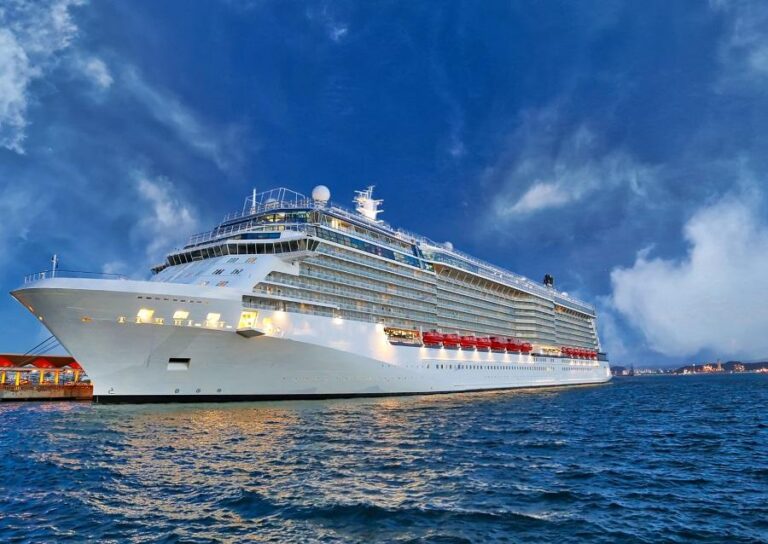Local Union Calls for Delay of Nice Cruise Ship Ban Amid Economic Concerns
In a growing debate over the future of cruise tourism in Nice, a local union is urging city officials to postpone the implementation of a newly proposed ban on large cruise ships. The ban, aimed at reducing environmental impact and preserving the local culture, has sparked significant concern among workers reliant on the cruise industry for their livelihoods. Union leaders argue that the abrupt policy change could deepen economic hardships in the region, highlighting the need for a balanced approach that considers both environmental sustainability and the economic realities faced by local businesses. As discussions unfold, stakeholders from various sectors are weighing in on the implications of the proposed ban, setting the stage for a complex dialogue on the future of tourism in this iconic French city.
Local Union Advocates for Delaying Proposed Ban on Cruise Ships in Nice
In a bold move that aims to protect local livelihoods, the local union has voiced strong opposition to the immediate implementation of a proposed ban on cruise ships docking in Nice. Union leaders argue that the maritime tourism sector plays a vital role in the region’s economy, supporting numerous jobs and businesses. According to spokesperson Jean Dupont, “A hasty ban could jeopardize the livelihood of countless families, especially as the tourism sector begins to recover from the pandemic.” The union is calling for a comprehensive consultation process to fully assess the economic and social impacts of such a ban.
Furthermore, the union has highlighted several key factors they believe should be taken into consideration before finalizing any decisions:
- Economic Stability: Thousands rely on jobs linked to cruise tourism.
- Environmental Concerns: A detailed analysis of alternative measures to mitigate environmental impacts should be explored.
- Stakeholder Engagement: Involving local businesses, residents, and tourism officials in discussions.
To emphasize their stance, the union has proposed a timeline that includes public forums and expert consultations, enabling a balanced approach to this multifaceted issue. They advocate for more time to develop sustainable solutions that benefit both the environment and the local economy.
Concerns Over Economic Impact and Job Security at Stake
The local union has expressed growing alarm regarding the potential ramifications of a cruise ship ban in Nice, fearing significant repercussions for both the economy and employment levels in the region. Union representatives argue that the ban could lead to a reduction in tourism, which has always been a pillar of the local economy. With cruise lines contributing millions of euros annually, stakeholders are concerned about the cascading effects this decision could have on various sectors, including hospitality, retail, and services that depend on cruise-related foot traffic. The union is urging local government officials to reconsider the timing and implementation of such a ban, emphasizing the need for a balanced approach that considers both environmental concerns and economic viability.
Amidst the ongoing discussions, the union has proposed a set of measures aimed at alleviating the impact of cruise ship tourism on the environment while preserving job security for the local workforce. Key suggestions include:
- Implementing stricter environmental regulations for cruise ships to reduce emissions.
- Encouraging alternative eco-friendly tourism options to offset the loss of cruise ship visitors.
- Establishing a community advisory board to ensure local voices are heard in future tourism-related decisions.
The union asserts that by adopting these measures, it is possible to find a compromise that protects both the environment and the livelihoods of local employees. Community workshops are planned to further gather input from residents and stakeholders on how best to navigate these challenges while fostering sustainable growth.
Potential Environmental Implications of Extended Cruise Ship Operations
The prospect of prolonged cruise ship operations in local waters raises significant concerns regarding environmental sustainability. Cruise ships, while providing substantial economic benefits through tourism, have been increasingly scrutinized for their impact on marine ecosystems. The potential for marine pollution is exacerbated by the release of wastewater and emissions from fuel combustion, which can lead to detrimental effects on local aquatic life. Specifically, the following factors must be considered:
- Air Quality Degradation: Release of sulfur oxides and nitrogen oxides contributes to air pollution.
- Water Pollution: Discharge of untreated sewage and ballast water can harm marine biodiversity.
- Noise Pollution: Increased ship traffic disrupts marine habitats and affects wildlife behavior.
Moreover, the cumulative environmental footprint of extended cruise ship operations can jeopardize the region’s natural resources. For example, the delicate balance of local ecosystems may be threatened by increased sedimentation and habitat degradation in coastal areas. A detailed examination of these implications suggests that careful management and monitoring strategies will be essential to mitigate risks. Consider the following environmental impacts:
| Impact Area | Potential Consequences |
|---|---|
| Marine Life | Disruption of breeding grounds and feeding patterns. |
| Coastal Habitats | Loss of biodiversity and habitat integrity. |
| Local Economy | Long-term damage to fishing and related industries. |
Recommendations for Stakeholder Engagement and Balanced Policy Solutions
To foster a constructive dialogue between stakeholders involved in the cruise industry and local communities, it is vital to establish open lines of communication. This can be achieved through regular public meetings and community forums where residents can voice their concerns and preferences regarding tourism and environmental policies. Engaging stakeholders—such as local businesses, environmental organizations, and residents—will ensure a holistic understanding of the impacts, both positive and negative, that cruise tourism brings to Nice. Key strategies for effective engagement include:
- Establishing a task force comprising diverse representatives to facilitate ongoing discussions.
- Creating transparent communication channels to disseminate information and gather feedback.
- Conducting impact assessments to inform policy decisions based on community input.
Moreover, crafting balanced policies that address both economic growth and environmental stewardship is essential for sustainable development. Policymakers should prioritize solutions that not only support the cruise industry but also protect the natural and cultural resources of Nice. Consider the following approaches to achieve a compromise:
| Policy Strategy | Description |
|---|---|
| Extended Consultation Periods | Allow ample time for feedback from the community before implementing bans. |
| Cruise Capacity Regulations | Limit the number of ships allowed in port simultaneously to reduce overcrowding. |
| Sustainable Practices Incentives | Provide incentives for cruise lines to adopt greener technologies and practices. |
In Retrospect
In conclusion, the local union’s call for a delay in the implementation of the Nice cruise ship ban underscores the complexities surrounding maritime tourism and its economic implications for the region. As stakeholders from various sectors weigh in on the potential impacts, including job security and environmental considerations, the debate continues to unfold. The union’s plea not only highlights the urgency of finding a balanced solution but also emphasizes the importance of collaborative dialogue between local authorities, businesses, and environmental groups. As this situation develops, all eyes will be on Nice to see how it navigates the intricate waters of tourism regulation and community compromise.




